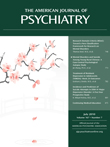To the Editor: Our article revealed the ineffectiveness of DSM-IV's clinical significance criterion in eliminating major depression false positive diagnoses, suggesting that further efforts are necessary. Dr. Stotland eloquently reminds us that further efforts are also necessary regarding false negatives. She observes that some depressed individuals mask their symptoms, and thus do not appear depressed, yet may be suicidal. However, the described patient satisfies major depression diagnostic criteria, and thus would not logically be a false negative.
Rather, the problem is epistemological, and potentially tragically so. False positive and false negative concerns are complementary in depending on optimally locating the boundary between normality and disorder, but they pose very different challenges. Dr. Stotland's example illustrates how even the loosest diagnostic criteria will not identify individuals whose symptoms are invisible to clinicians and intimates, nor will such criteria bring them into treatment against their will, and community screening will not necessarily help when individuals are inclined to hide their symptoms.
Human beings are adept at masking their feelings when motivated by shame, fear, pride, social desirability, or resoluteness in pursuit of a goal (e.g., suicide). Moreover, cross-cultural differences in emotional "scripts" and gender roles can yield widespread masking of feelings. Dr Stotland's example underscores the crucial clinical importance of a trusting therapeutic alliance and sensitivity to the patient's concerns and defenses, enabling the reluctant patient to communicate with us. No symptom checklist can substitute for the diagnostic importance of this relationship.
Those needing but not seeking our help, as in Dr. Stotland's example, pose a public health and prevention challenge. The ready availability of help and the acceptability of seeking it must be widely disseminated in various subcultures.
However, to return to the false positives problem, despite attempts to destigmatize mental disorder, efforts to link reluctant individuals with help may not be best served by framing all intense human distress as a medical disorder, but rather by recognizing and accepting the varieties of normal human response and suffering. Dr. Stotland's urgent challenge to detect the seemingly undetectable must not mislead us to justify extraordinarily expansive diagnostic or screening criteria that encompass everyone so that we miss no one, undermining the profession's credibility. The attempt to avoid false negatives is not well served by abandoning efforts to eliminate false positives.
Finally, as Dr. Stotland observes, many suicides do not result from major depression, nor is there any evidence for the prevalence of the particular type of example she describes. Such affects as anxiety, shame, or rage as well as impulsive reactions to distress or the effects of substance intoxication may be potent triggers of suicidal behavior in some individuals. Moreover, there are also rational deliberative or culturally sanctioned decisions to end one's life. This variety is reflected in the DSM-5's useful proposal for a suicide risk assessment scale that would routinely be applied across diagnostic categories.

